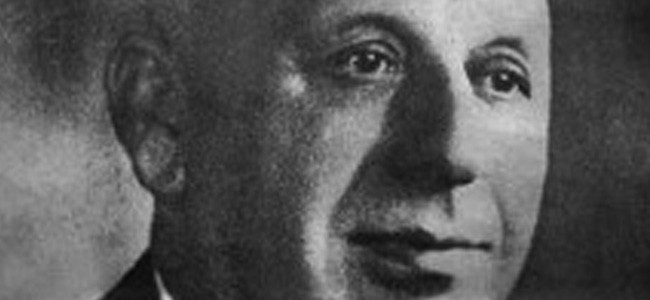
Konstantinos Maniadakis, the Greek Himmler
 Konstantinos Maniadakis (Greek: Κωνσταντίνος Μανιαδάκης) was a Greek Army officer and politician who became notorious as the formidably efficient chief of the internal Security Services of the 4th of August Regime (1936–1941).
Konstantinos Maniadakis (Greek: Κωνσταντίνος Μανιαδάκης) was a Greek Army officer and politician who became notorious as the formidably efficient chief of the internal Security Services of the 4th of August Regime (1936–1941).
He was born in Sofiko, Corinthia, on 25 July 1893. He was a career Engineers officer in the Army, but in 1929 he resigned from it. He was a long-standing acquitance of Ioannis Metaxas and, when the latter established the 4th of August regime, Maniadakis was one his strong men as the head of one of the three most important new vice-ministries established. However, he was not Metaxas’ first option, as the Archigos first chose Theodoros Skylakakis. However, after Skylakakis was forced to resign, Metaxas appointed Maniadakis to head the Under-Ministry of Public Security.
The newly established Secretary of State had under its jurisdiction all the security forces in the country (the Royal Gendarmerie, the Police, the Fire Department and the Directorate of Immigration and Passports). Maniadakis was also responsible for directing military intelligence, conducting counter-espionage against foreign powers, uncover foreign spies (especially those of Italy, Bulgaria and later on, Germany and Britain), and compiling detailed reports on the Greek political establishment.
Maniadakis’ efficiency began to show itself early. Already in the first months of the dictatorship, no less than 1,330 citizens were arrested by the police and charged them with political crimes; around a thousand of them were expediently sent to remote islands in the Aegean while the rest faced heavy prison sentences. It was only the beginning. Throughout the dictatorship, over 30,000 people would be arrested, confined in concentration camps or sent into exile to remote Aegean islands.
Under the supervision of Maniadakis, the Gendarmerie force increased by 20%, the City Police – free from political interference and partisan considerations – also boomed and the Political Police force Asfaleia (the Greek equivalent to the Gestapo) increased its staff from 190 to 445 officers and non-commissioned officers and to about 1,200 agents.
It was also entrusted with one of the basic functions of the Metaxas government: the fight Communism. In fact, Maniadakis’ most notable accomplishment may have been the near total suppression of the Greek Communist Party KKE.
The enactment of Emergency Law 1075 (“Peri Metron Asfaleias tou Kinonikou Kathestotos ke Prostasias Ton Politon”, Measures for the Safety of the Social Regime and the Protection of the Citizens) of February 11, 1938 gave him unlimited power on that mission.
To that end he incarcerated hundreds of KKE members causing havoc and published a government-controlled version of the Communist newspaper Rizospastis, which caused further chaos and mutual distrust among the Communists. He also managed to arrest the KKE’s leader Nick Zachariadis, thus beheading the party’s apparatus. By these actions, during his tenure he managed to almost completely suppress and disorganize the KKE, which was the main force of opposition in the country.
The communist threat provided a convenient pretext for the repressive measures of the regime, and the Greek police were able to make mass arrests and do comprehensive compilations of observations of members of the opposition -not only KKE- and their activities.
Maniadakis obtained valuable help in his work from his counterpart in Germany, Heinrich Himmler, as the German Gestapo and the Greek Asfaleia shared techniques and experiences in suppressing the opposition. Bynamed ‘the Greek Himmler’, Maniadakis was very succesful in his duties and he managed to keep any kind of resistance to the Metaxas dictatorship at stake.
He stayed as the Interior Minister until the demise of the Fourth of August regime in April 1941. Following the German invasion of Greece, he continued in office in the early months of the Greek government in exile as Interior Minister, but was soon forced to resign (like the Propaganda minister Theologos Nikoloudis). He then went to live to Argentina, where he stayed until 1949, when he returned to Greece. After the end of the Greek Civil War, he was elected several times to the Hellenic Parliament. He died in Athens, 28 February 1972.
By Andreas Markessinis
Mention: » The end of the 4th of August regime | METAXAS PROJECT | Ioannis (John) Metaxas
Mention: 1940 – The formation of the 1st Greek ski battalion | Metaxas Project
Mention: From Metaxas to Tsolakoglou: From dictatorship to collaborationism | Metaxas Project
Mention: Μια μεγαλη Αδικια | Metaxas Project
Mention: Propaganda and ideology of the 4th of August regime in the context of Hitler’s ‘New European Order’ | Metaxas Project